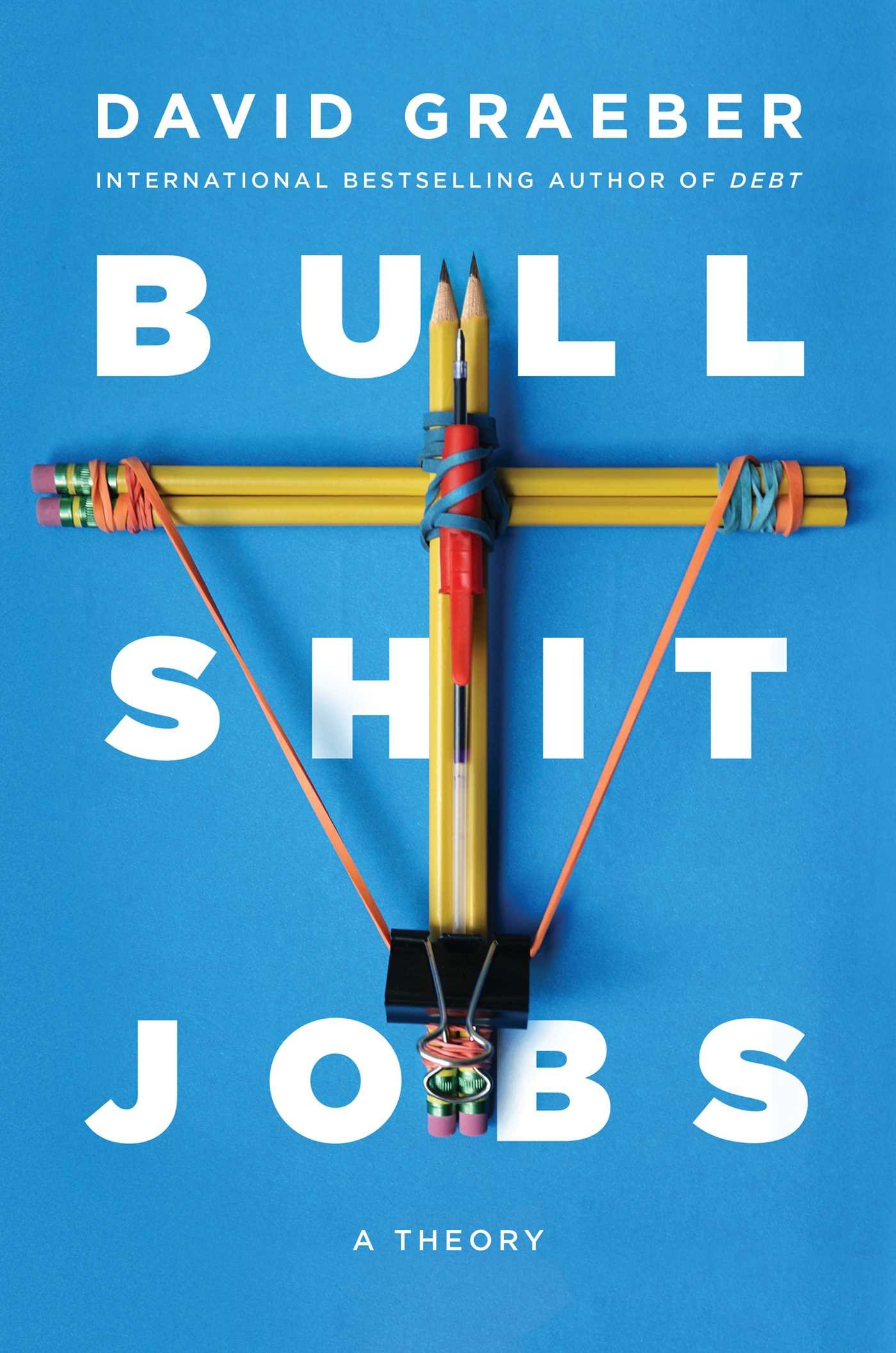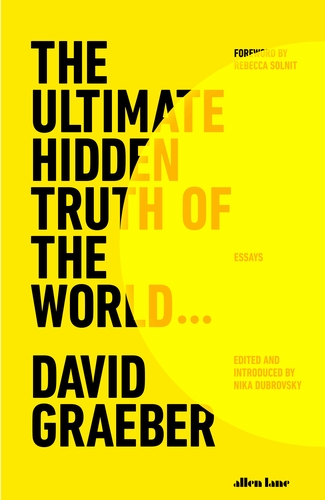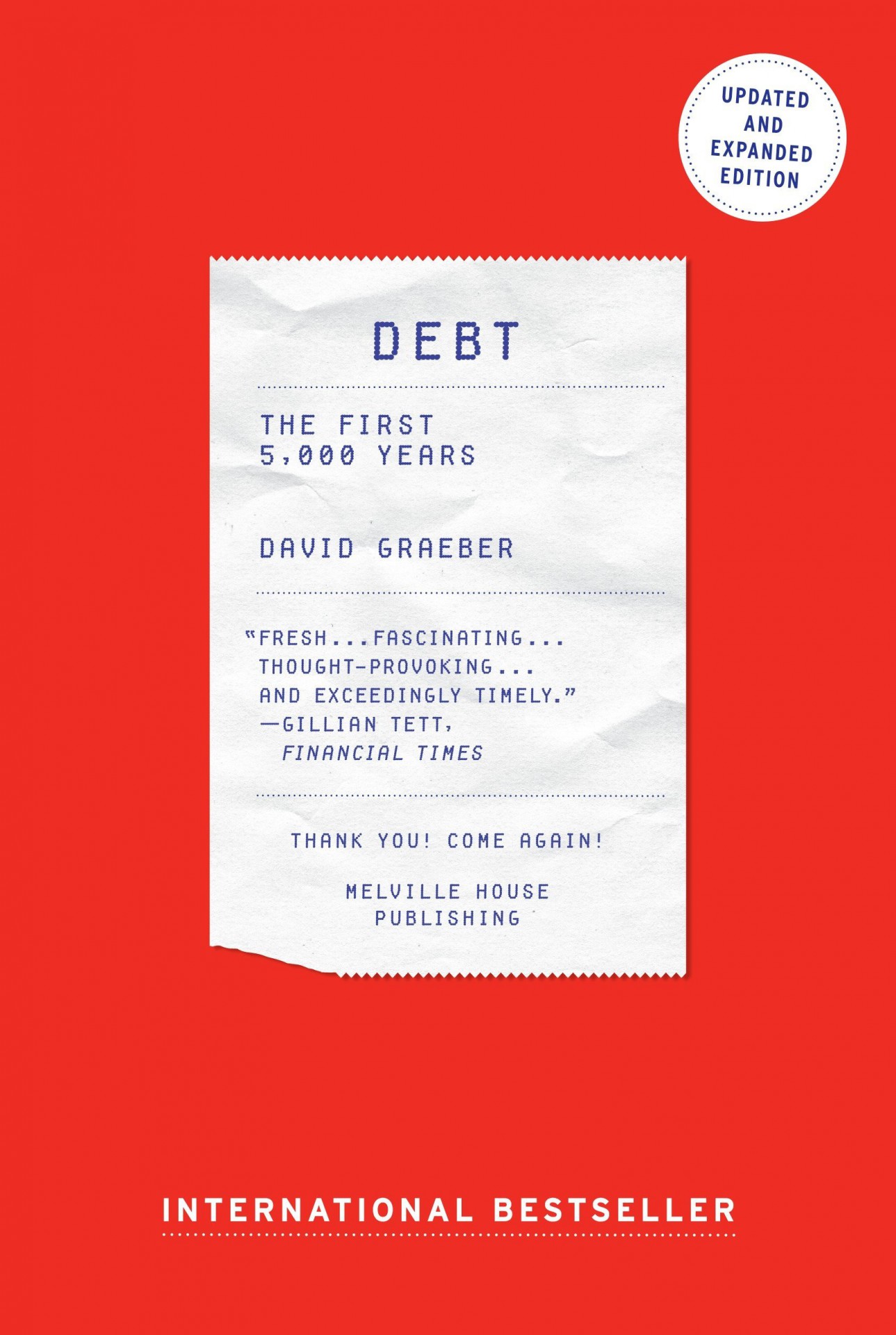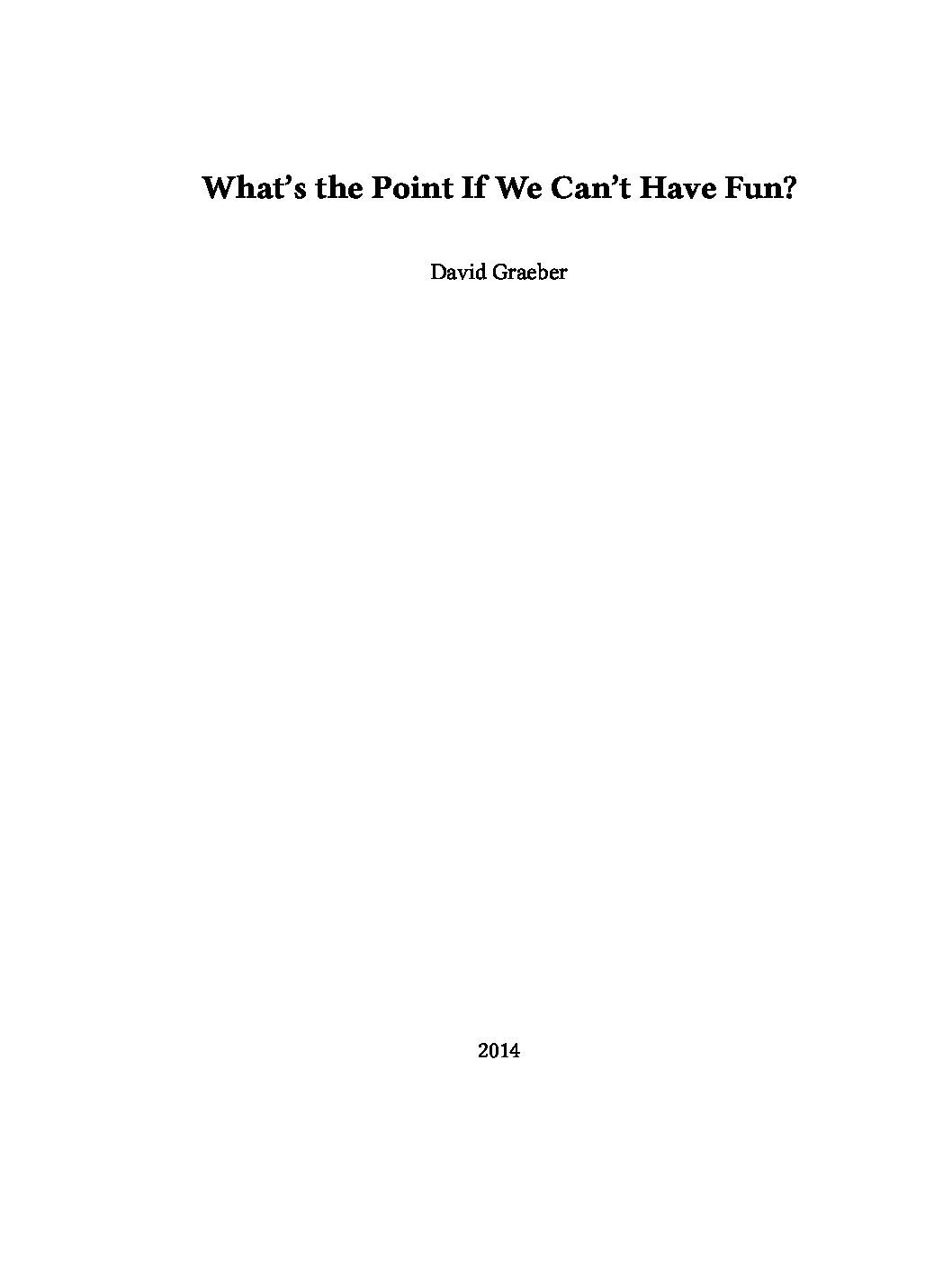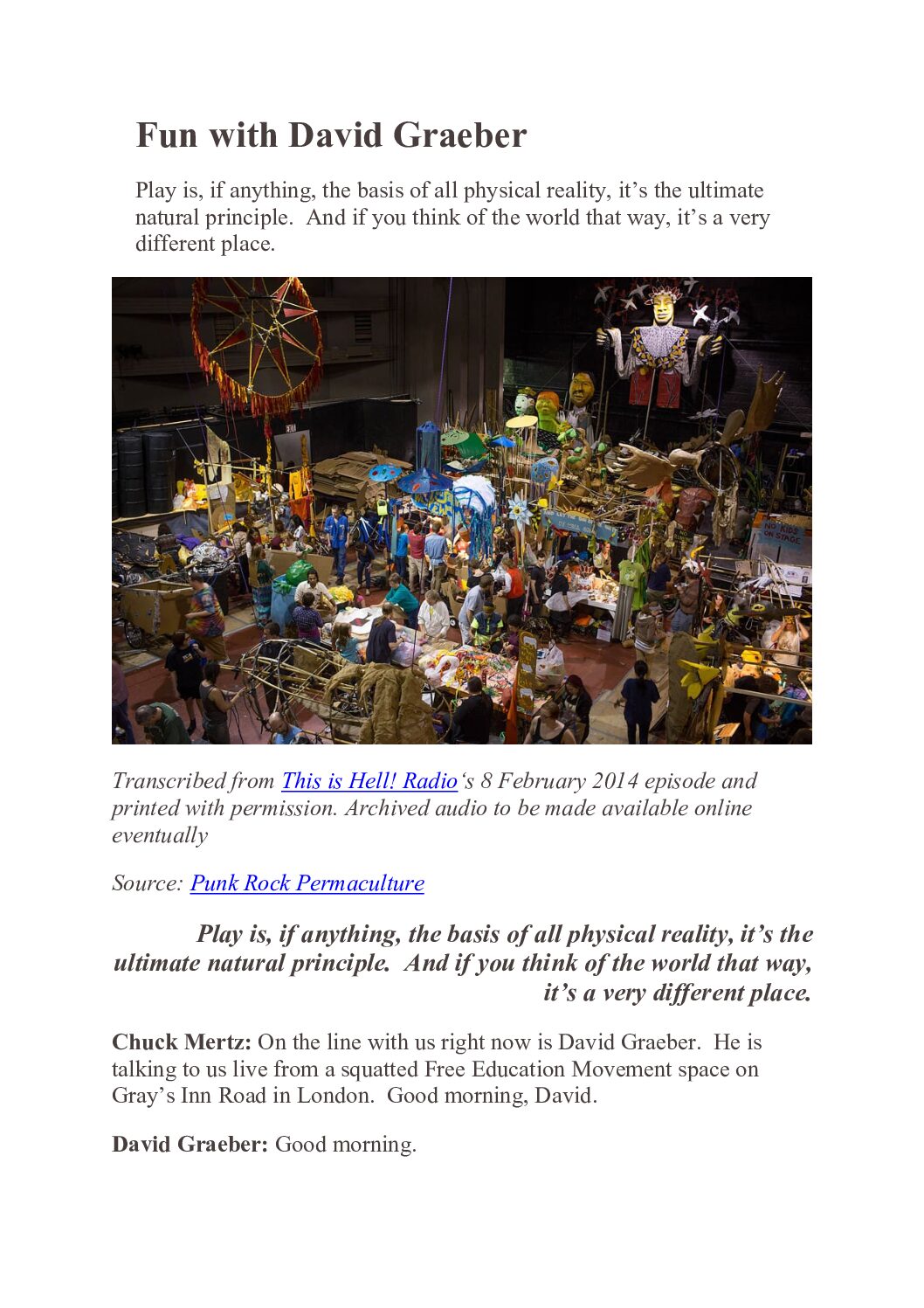
Fun with David Graeber
8 Feb 2014
Play is, if anything, the basis of all physical reality, it’s the ultimate natural principle. And if you think of the world that way, it’s a very different place.
Transcribed from This is Hell! Radio‘s 8 February 2014 episode and printed with permission.
Chuck Mertz: On the line with us right now is David Graeber. He is talking to us live from a squatted Free Education Movement space on Gray’s Inn Road in London. Good morning, David.
David Graeber: Good morning.
CM: David is an anthropologist, a professor at the London School of Economics and the author of the book Debt: The First 5,000 Years. He’s on today to discuss his piece in the just-released issue of the magazine The Baffler. The name of his article is What’s the Point If We Can’t Have Fun? David, after reading your article I think the best way to start this conversation is to ask you: is fun an illusion?
DG: No. I can’t imagine anything that’s less of an illusion. I think that we’re encouraged to think that there’s something wrong with doing something just because we enjoy it. But that’s exactly the sort of mindset I was trying to challenge.
CM: You start the article by retelling the story of how you and a friend of yours spent half an hour observing inchworms playing. It’s really great. Then you write, “most of us hearing this story would insist on proof. How do we know the worm was playing? Perhaps the invisible circles it traced in the air were really just a search for some unknown sort of prey, or a mating ritual. Can we prove they weren’t?” Do you believe the scientific analysis of the inchworm as a calculating machine is affected by the economy that scientists live in, whether it’s within the institution where they work or within their personal life?
DG: It’s all those things. Very often a scientist’s personal life contradicts all of their theories. But we’re taught that only certain types of arguments can be taken seriously. It’s very similar to economics. In our everyday lives, we do a lot of things because we care about people, or sometimes because we hate people, but which make no sense by economic logic. But when you want to look ‘scientific,’ you have to pretend that everybody’s motivated by rational means. And somehow ‘rational’ means selfishness. If you can’t figure out a way that [an activity] is pursuing self-interest, then you’re not doing a ‘scientific’ analysis. I don’t know why being ‘scientific’ means acting in a way that most of us, in our daily lives, would consider pure cynicism. But that’s the way it seems to work.
Same thing in the animal world. We apply this logic that we have to figure out a rational motivation for why [a behavior] is evolutionarily adaptive. And if we can’t, then we can’t really say anything about it.
CM: Whether science or journalism, there’s this attempt to be ethical by being “objective.” Now in journalism, objectivity can never truly be attained. That said, objectivity as a goal can lead to less opinion and more factual reporting. Why shouldn’t a good, objective, un-opinionated scientist explain behavior in rational terms? After all, isn’t that what we want from climate change scientists? No political agenda against fossil fuel consumption, only a “rational” decision on global warming?
DG: Well, no one’s against rationality. What I’m saying is we have a strange idea of what rationality is. Why don’t we do a rational analysis that says that, to some degree, animals just want to have fun? It would be accurate. It would be irrational to pretend that there’s only one or two motivations that effect all beings—which is what we seem to do.
CM: You write that the experience of animal play is considered something of an intellectual scandal. Why would it be an intellectual scandal?
DG: That’s the interesting question; why would it? Why shouldn’t things want to have fun? There was a time when it wasn’t that way, even in the 19th century. I go back to Prince Kropotkin, who was both a great naturalist and a famous anarchist who wrote a book called Mutual Aid. Most people don’t really understand the book, they think it has to do with altruism.
If you’re thinking in an economic logic, altruism is a big problem. How do you explain that people are ever nice to anyone? How do you explain that anyone ever violates their own self-interest to advance the self-interest of someone else? Bees, when they sting you, they die. Why would they sacrifice themselves to protect the hive? There are herd animals, when a predator shows up, the one who sees the predator will scream, alerting all the other ones but drawing attention to themselves and making it much less likely that they will individually survive.
So this became a big mystery. People thought the only way to explain [altruism] is inclusive fitness, genes. The thing that’s pursuing its self-interest isn’t the animal, but the animal’s genetic code. Suddenly a strand of DNA becomes a self-interested actor—as The Selfish Gene, Richard Dawkins’ book said—trying to maximize and spread itself out as far as it possibly can.
But if you look at what Kropotkin said, actually he wasn’t just talking about altruism. He was talking about cooperation between species which isn’t advancing anybody’s genetic code. He was talking about cooperation which is just for fun. He has these wonderful passages about birds, for example. Birds who flock up and do these crazy military-style maneuvers—bank this way, bank that way, curve around a mountain—and for no reason whatsoever. They’re just doing it for fun. And often one species of bird will do this, and other birds will sneak in, because it’s so much fun they want to get in on it, and hope nobody notices they’re not the same type of bird. How do you explain that in terms of inclusive fitness, or evolutionary adaptation? You can’t. So we just ignore that part of the argument.
CM: Maybe Freud would have something to say about this, but the first thing I thought when I read your article was how the Christian Right here in the U.S. claimed for so long that homosexuality wasn’t natural because you didn’t see it in the animal kingdom…but you do, so some have turned to the argument that, well, we’re better than those gay animals! Is there some link between scientists being scandalized by the notion of animal play and Christians being scandalized by homosexuality in the animal kingdom?
DG: Well, yes. A perfect example is having sex just for fun. It’s not reproductive. If it’s not reproductive we’re not supposed to be doing it. Evolutionary psychologists have this book called Why Sex is Fun. They claim to be able to explain why sex is fun. But they can’t explain why fun is fun.
That’s the real question. Why do we do things for fun to begin with? Why do we do things for love, for pleasure? Again, I go back to Kropotkin. He says that if you’re a social being, then if you do something for fun, doing it with someone else or doing it with a group is even more fun. Most of our pleasures are pleasurable because we do them with other people. I always use the example of a restaurant. You don’t really want to go to a big expensive French restaurant all by yourself. Half the fun is doing it with someone else.
CM: You write “Why do animals play? Well, why shouldn’t they? The real question is why does the existence of action carried out for the sheer pleasure of acting—the exertion of powers for the sheer pleasure of exerting them—strike us as mysterious?”
Sarah Kendzior had an article called The Price of Creativity, on how New York City’s prices were making the cultural hub inaccessible to creative artists. In the article she talked about how the art that’s produced is often accepted, but the lifestyle and the process, the struggling that’s necessary for a starving artist to produce is often hated, mocked or dismissed. Does action carried out for sheer pleasure strike us as mysterious because, more than anything else, the one shared characteristic we all have is that we’re capitalists?
DG: That’s ultimately the message. What Sarah Kendzior is talking about is something that goes back to the 19th century, the birth of “Bohemia.” Someone once said that Bohemians and Bourgeois people hate each other because Bohemians sacrifice comfort for the sake of pleasure, and the Bourgeois sacrifice pleasure for the sake of comfort. But if you think about it, this crazy creative pleasure is where almost everything we consider worthwhile actually comes from. The Bourgeois need it. They can’t do without it, but they also have to hate it.
There’s a feeling in our culture that play, that creativity is almost demonic. You need it to drive the engine, but it scares you. You need to isolate it, put it someplace where it’s not that dangerous. We have to isolate it from the political domain—any kind of imagination or sense of play or fun is only going to lead to the Gulag; any kind of transformative, visionary politics scares us. Creativity is something that we obviously need, and we talk as if we like it all the time, but really we don’t.
I find this in academia all the time. Why do you go into an academic job, why do you become a scholar? It’s partly because it’s fun. You could go to law school for two years and make eight times the money. The reason to go into academia is because it’s pleasurable, it’s fun, it’s basically a form of play—you get to play with ideas. But somehow academics manage to convince themselves that—what with the insecurities of the job market—in order to get that security, that comfort, you have to give up the pleasure. You have to become this boring, pedantic academic politician, saying the right things, thinking the right things, publishing in the right places. It all becomes this careerist, professionalized cage, and you hate yourself for it, and thus what you really hate is anybody who seems to be having fun. I’ve had this for my whole career. I think that when I was a junior professor, one reason senior professors didn’t really like me very much was because I wasn’t miserable. I was really enjoying what I was doing.
CM: [Before this interview], people asked me how I was going to have a conversation about fun with David Graeber—it seems incredibly esoteric. Just so people don’t think that this is some disconnected, high-falutin’ discussion here, how does this debate over “if fun exists” directly impact the lives of our listeners every day?
DG: It’s critical. People tell you that you’re supposed to be ashamed of fun, or you’re supposed to contain it. Maybe you can do it when you’re around your kids, because kids are allowed to have fun. That’s one reason people want to have kids to begin with, because they get to have vicarious fun playing around. There are certain domains within consumerism where you’re allowed to do it, but it’s contained. We’re almost scared to let go.
As a result, we end up trapped in this situation where we ‘work,’ but that’s defined as being the opposite of fun. We convince ourselves that work is moral. But working is not having fun. Working means doing something you don’t really want to do. Because if you’re having fun doing it, if you’re enjoying doing it to any degree, then it’s not really work and therefore you’re not a morally good person.
And there’s this resentment. If somebody seems to be having fun, we get angry at them on some level. How come they get to enjoy their job? How come they get to do something they really like? How come they get to do something that’s actually worthwhile and helps people? That’s part of the point of my Bullshit Jobs piece; it’s about resentment at people who get to have ‘real’ jobs, fun jobs. It’s a way of making ourselves collectively miserable; everybody’s trapped in this strange morality, where if you’re enjoying what you do then somehow there’s something wrong with you. You’re taking advantage of other people. You have to be miserable.

CM: I thought I’d send your article to my sister, who is a biologist, a Ph.D., author of half a dozen textbooks, herpetologist, entomologist—and here’s what she wrote: “Of course, to a biologist, everything comes down to procreation, it all leads back to sex. ‘Survival of the fittest’ is another way of saying the species persists based on the reproductive fitness of its members. That’s the theme of my animal behavior class, actually. The students consider different behaviors’ effects on reproductive fitness. Lots of good discussions arise, and it’s a lot of fun.” So is anything fun, or are we always simply trying to reproduce? And what about someone like me who does not want to reproduce, and has not reproduced (according to America’s legal system)? Is my fun still driven by an innate desire for reproduction, for sex, whether I act on it or not?
DG: Well, the biologists have a point that if there’s a species that doesn’t reproduce, then that species won’t be around for very long. So you’ve got to do it. But the fact that somebody’s got to be doing it isn’t an explanation for everything that ever happened.
No, in the piece I propose something much more profound. I say the world is full of “self-organizing systems,” as scientists call them. Things seem to have mechanisms for regulating themselves, whether it’s an electromagnetic field or a crystalline structure that forms these incredible patterns that get more and more complicated and build on themselves. Even subatomic particles are self-regulating systems on some level.
Nobody’s quite sure how that happens. The way we talk about evolution, the world consists of these automatic machines that follow natural laws…but where do the natural laws come from? Nobody says. They just somehow appeared with the Great Bang and have never changed ever since.
And then suddenly at some point, BAM! we get humans, and we get philosophers and poets and they come completely out of nowhere. That doesn’t make any sense. Clearly something like thought, something like the mind has to exist. If you’re going to take a materialist explanation of where things come from, unless you’re going to say it’s spirit, it’s imposed somehow on material reality—it comes from someplace else; it’s got to come from the world somehow, it’s just a more complex version of these self-organizing systems that are already going on. Then the question is, what motivates it?
This was the big point that I was trying to make in the piece. Alright, we seem fine with this idea of the “selfish gene,” that somehow our DNA molecules—which are just strands of amino acids—“want” to expand. Through sex and reproduction they want to make as many copies of themselves as possible. So we learn to attribute this self-interested motivation to certain types of cells. But why not crystals? Why not a snowflake? Why not an atom, an electron? We can’t predict how electrons jump. The whole point of quantum theory is that you can’t actually predict what a particle is going to do. You can do a statistical analysis, say 40% of them will do this and 20% will do that. But you can’t predict what this one’s going to do. It seems something like free will. But somehow we shudder at the idea of doing the same thing [with elementary particles] that we do with DNA molecules.
Why not do that with a snowflake? Well, it’s easy. You can’t apply an economic self-interested model to a snowflake. A snowflake doesn’t have self-interest. You can’t apply it to an electron. An electron is not trying to reproduce, it’s not trying to gain an advantage over other electrons. The only way that you could attribute agency or intentionality to those sorts of phenomena would be to say they’re exercising freedom just for the sake of doing so. But then you’re saying, basically, they’re having fun. It’s a form of play. Play is, if anything, the basis of all physical reality, it’s the ultimate natural principle. And if you think of the world that way, it’s a very different place.
CM: You write, “the neo-Darwinists went even further than the Victorian variety. If old-school social Darwinists like Herbert Spencer viewed nature as a marketplace, albeit an unusually cutthroat one, the new version was outright capitalist. The neo-Darwinists assumed not just a struggle for survival but a universe of rational calculation driven by an apparently irrational imperative to unlimited growth. This, anyway, is how the Russian challenge was understood. Prince Peter Kropotkin’s actual argument of cooperation, the Russian argument, is far more interesting. Much of it, for instance, is concerned with how animal cooperation often has nothing to do with survival or reproduction but is a form of pleasure in itself.”
I know this sounds like a stretch, but is this the very essence of the Cold War? Did the cutthroat capitalists win?
DG: Well, the Cold War made it an ideological imperative to say that capitalism itself is located in our genes. Even back in the 19th century, they were trying to make the argument that capitalism was really natural, that we’re all basically capitalist.
But there was a whole alternative school that talked about cooperation. Kropotkin, who was an anarchist, put a shot across the bow at the social Darwinist position, saying almost all human achievement comes through cooperation, not through competition. Even animals cooperate and enjoy cooperation. Sure, competition exists, but it’s not really what drives things forward.
So [social Darwinists] had to scramble. They really took this threat seriously. And that’s why they came up with an explanation for altruism and cooperation based in genes. The discovery of genes and eventually the double-helix made it easier to make this argument. But in doing so, they went from a mere market model to this idea of capitalism.
Capitalism is based on infinite accumulation. That’s why economies always have to expand. The new version, where you have the “selfish gene” and we’re willing to sacrifice ourselves to maximize the furtherance of our genes, it’s the genes that are really pushing it. The genes want to expand infinitely. That’s real capitalism. It’s not just a market; our genetic code is all these little corporations which are seeking infinite growth.
CM: You write, “There is a way out of the dilemma in this discussion of fun and if it actually exists within nature. And the first step is to consider that our starting point could be wrong. Reconsider the lobster. Lobsters have a very bad reputation among philosophers, who frequently hold them out as examples of purely unthinking, unfeeling creatures. Presumably this is because lobsters are the only animal most philosophers have killed with their own two hands before eating. But in fact, scientific observation has revealed that even lobsters engage in some forms of play. If that is the case, to call such creatures robots would be to shear the word ‘robot’ of its meaning. What would happen if we proceeded from the reverse perspective and agreed to treat play not as some peculiar anomaly but as our starting point, a principle already present not just in lobsters and indeed in all living creatures, but also on every level where we find what physicists, chemists and biologists refer to as self-organizing systems?” If we viewed the world that way, how would our world change, David?
DG: Well, I think a lot of things would be easier to understand. I think that it would open up really interesting new areas for research. It’s not as if things like animal play aren’t studied, but it’s almost as if people are embarrassed to study play. There are whole domains of animal behavior, or human behavior, that we know exist and we’re not going to deny it, but we don’t like to talk about it. It’s not what we think is interesting or important. It’s self-interested behavior that we think is important.
But we could completely reverse the rubric and start with play and fun. Why do people put on rituals? Barbara Ehrenreich made this point in her companion piece. She talked about festivals. Anthropologists find all these crazy festivals all over the world, and the first instinct is to say they must follow a social function, they must reproduce social order in some sense, they must be ways of inculcating ideological ideas about proper hierarchy, they must be something other than what they seem to be. But maybe they are largely what they seem to be.
Maybe the major motivation for having elaborate rituals is because they’re really fun. Maybe that’s why we still have a monarchy in England. They’re using this sense of pleasure that we get from having all these crazy costumes and ceremonies, and using it against us to maintain a class system. Maybe there’s a political message here. We’ve got to come up with something even more fun! Even crazier costumes, even better rituals.
CM: This brings me back to my sister, the biologist. She writes, “the problem with determining the presence of fun is that the definition is all about what it’s not. A behavior that’s not about mating, that’s not about finding prey, that’s not about improving fitness, reflexes etcetera—you have to prove that it’s not anything else. Based on that it’d be hard to prove that humans engage in fun, either.” Do we have to prove it’s absolutely nothing else to prove that it’s fun?
DG: That’s exactly the problem that I start with. Here’s an inchworm, it seems to be dancing around in a goofy way for no particular reason. But no one’s willing to accept that it’s just having fun until going through every other thing it could possibly be doing and proving that it’s not one of those things.
Well, how do you do that? Just because something’s fun, doesn’t mean it might not be good for other things too—and that doesn’t mean those other things are the primary reason. So we just need to start with the obviously observable reality. This video has been going around Youtube recently, of a crow tobogganing down a loop repeatedly on a little tin can top or something like that. There’s no functional, rational, utilitarian explanation for this bird’s tobogganing because—same reason you go tobogganing—it’s fun. So let’s start from that. We can say it does something else too—that’s interesting—but accept the reality that is presented to us as our starting point.
Or ants! Apparently since the 19th century it has been observed that, while sometimes ants have real wars between anthills, sometimes they have mock-wars. Like ant “Capture the Flag” or something. Two different anthills have these big battles and nobody gets hurt, they all go home. If ants can have fun, come on.
CM: This has been a fantastic conversation. David, our last question, as it is for all of our guests, is the Question from Hell. The question we hate to ask, you might hate to answer, or our audience might hate the response. I guess this is kind of a two-parter, I couldn’t decide which of these should be my Question from Hell. So can you answer both? Is sex fun, or is fun sex? And is play, and fun, the meaning of life?
DG: If it’s not fun, you’re not doing it right, I would say. In ancient Mesopotamia they had the idea that non-procreative sex was sacred. Because after all, procreative sex, animals do that. All other forms of sex were divine to them. Of course, what is more divine than fun? So that would be one answer of a kind. Maybe they were right, who knows?
What was the second question? Is fun the meaning of life? Well, having fun in a way that puts others in a position to have fun is about as close as you’re going to get. I’ll end with a story. Have you ever read Brothers Karamazov, where they’re talking about heaven and hell? There’s a scene where the head of the monastery is discussing heaven and hell and how God could punish people if God is good. And the head of the monastery said, well imagine it this way: imagine you die and you are eternally fine. You have no more pain or misery, you just exist in an eternal state of comfort, but you remember absolutely everything that happened in your life and exactly how it affected everybody else.
So if you were a good person you’ll be happy. But if you were a bad person, you’ll desperately want to compensate somehow. But what can you do? You’re in heaven, and everybody’s doing fine. So there’s nothing you can do to actually make their lives better because their lives are fine, so you’re miserable—and that’s hell.
I thought that was a very interesting idea. And I mentioned it to a friend of mine many years ago, and he said, “nah, that’s not true. There’s things you could do. Because even if you don’t have material needs, hunger, pain—you’re still going to be bored. So you could make up games and have fun and entertain the other people in heaven and therefore compensate for your evil life.” And I thought, yeah. In a way, that’s the ultimate thing you could do. Creating a situation where others can have fun, perhaps that’s the ultimate.
CM: That’s a great way to finish this conversation. This has been an amazing talk. It really has been a pleasure. Enjoy the rest of your evening in London.
DG: Thanks so much. Take care.

